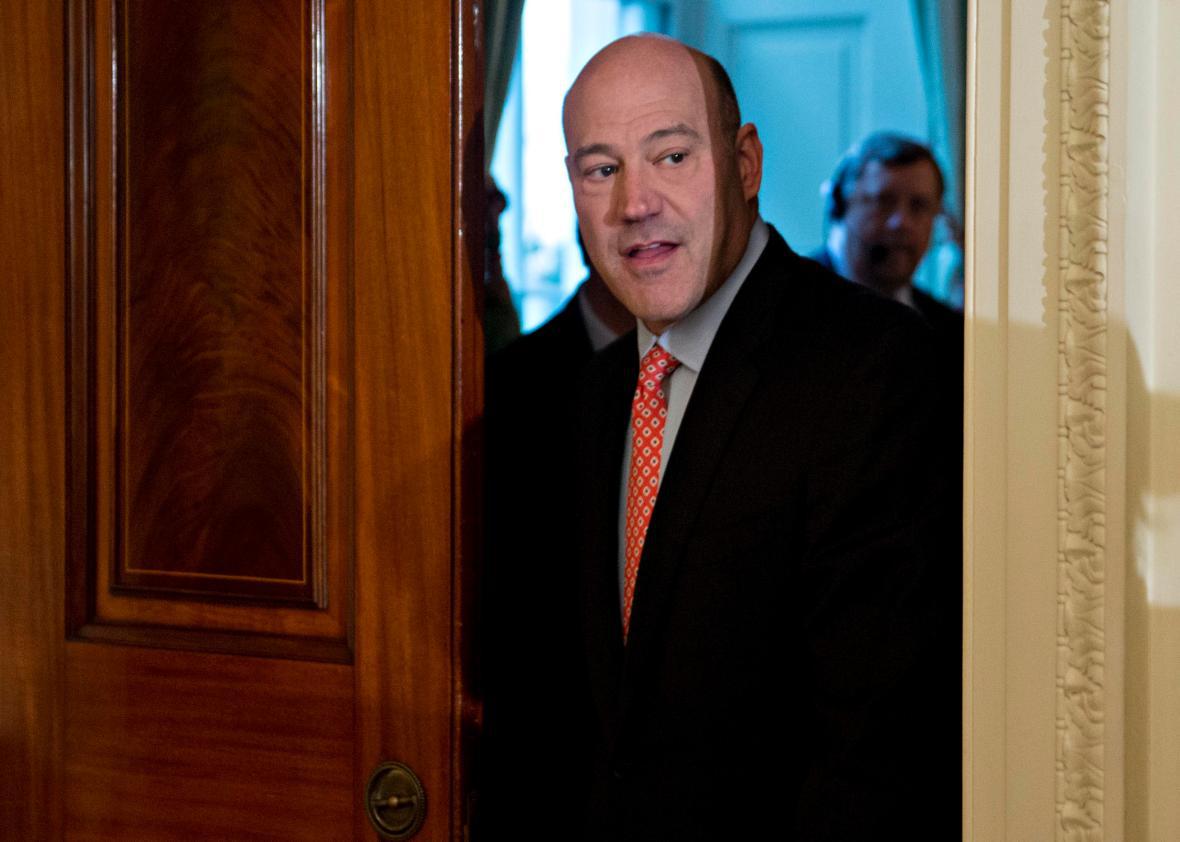Donald Trump’s top economic adviser privately told a group of lawmakers Wednesday that he would support bringing back a version of Glass-Steagall, the Depression-era law that separated consumer and investment banking until it was repealed during the late 1990s.
Bloomberg reports that Gary Cohn, the White House National Economic Council director who was previously the president of Goldman Sachs, said he favored the idea during a closed-door discussion with a group of senators after being asked about it by financial reform champion Elizabeth Warren of Massachusetts. Cohn’s response apparently shocked many of those in the room, who didn’t expect a former Wall Street executive to come out in favor of chopping large banks down to size.
But maybe it shouldn’t be so surprising.
The crusade to resurrect Glass-Stegall, which forbid deposit-taking banks from doing business in the risky securities markets, has mostly been led by lefty politicians like Warren and Sen. Bernie Sanders, who made it a centerpiece of his presidential campaign. But Republicans have also flirted with the notion in the era of Trump, if only as a matter of political convenience. Last summer, party officials added a line to the GOP’s official platform calling for the law to be reinstated. In the context of an overwhelmingly pro-business, anti-regulatory document, the move mostly seemed like a cynical gesture to win over wavering Sanders supporters from Hillary Clinton. But in February, press secretary Sean Spicer said the president was still a Glass-Steagall supporter.
Treasury Secretary Steve Mnuchin has been a bit more cautious. He told Congress during his confirmation hearing that reviving the old version of the law in its entirety could hamper markets and hurt lending. “I don’t support going back to Glass-Steagall as is,” Mnuchin told the Senate Finance Committee. “When we talked about policy with the president-elect, our view is we need a 21st-century version.” Whether that hypothetical law would track with, say, the 21st-century version Elizabeth Warren would write is unclear.
However, it isn’t hard to imagine why someone like Cohn might find the idea of Glass-Steagall appealing. Remember that until the financial crisis, Goldman Sachs, where Cohn spent his career, was still a pure investment bank, even though Glass-Steagall had been repealed. It morphed into a bank holding company during 2008 in order to access emergency loans from the Federal Reserve, which put it in the same category as true financial services conglomerates like Bank of America and JPMorgan Chase. But while plebes like you and me can finally open a Goldman Sachs savings account, vanilla consumer banking has never been a big part of its operations. Rebuilding a wall between the boring business of taking deposits and making loans and the more exotic arts of making markets and underwriting probably wouldn’t hurt the Vampire Squid much, and might even give it a tentacle up on its competition.
If you think about it, the mere fact that Goldman Sachs was so profitable until 2008 is a pretty good rejoinder to the usual argument Wall Street lobbyists make against bringing back Glass-Steagall: that it would prevent smaller American financial institutions from competing against foreign megabanks. Well, Goldman seemed to do just fine. Maybe Cohn has considered that.
Of course, even if one could see how Cohn might sincerely be open to the notion of a new Glass-Steagall, it doesn’t mean the administration will actually pursue such a law any time in the near future. So far, Trump’s comments on financial reform have focused on gutting Dodd-Frank. And while Sen. John McCain may be on board with Warren’s regulatory revivalism, the issue is nowhere on the Republican legislative agenda right now.
But let’s say the GOP suffers a beating in the midterms, and Trump starts casting about for a bipartisan idea that will bring back some of that populist magic. Could breaking up Goldman Sachs’ competition become a priority? I wouldn’t be too shocked.
